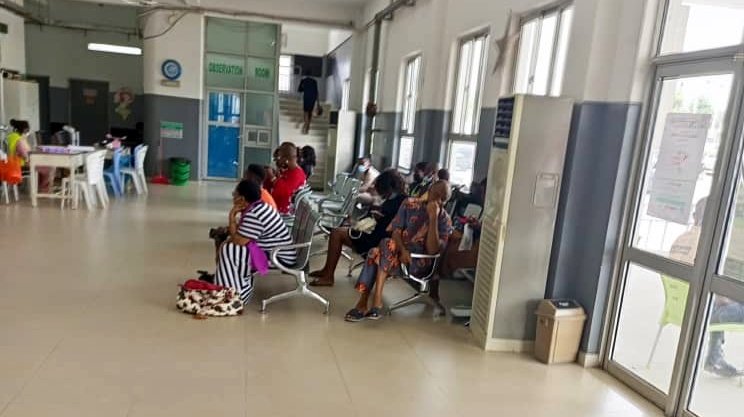The federal government has announced a fresh disbursement of N32 billion under the Basic Health Care Provision Fund (BHCPF) to revamp over 8,000 primary healthcare centres (PHCs) across the country.
The Chairperson, Health Commissioners Forum, Oyebanji Filani, made this known in Abuja on Monday, on the sidelines of the 11th meeting of the Ministerial Oversight Committee (MOC).
Mr Filani, who is also the Ekiti State Commissioner of Health, noted that this is part of efforts to strengthen basic healthcare delivery and ensure access to essential services for millions of Nigerians.
He said the funds, released in two tranches of N16 billion each, would support renovations, procurement of commodities and capacity building of frontline health workers under the BHCPF.
Meanwhile, the Coordinating Minister of Health and Social Welfare, Muhammad Pate, explained that the intervention is already yielding results, with over 37 million visits to PHCs recorded nationwide.

“This is a testament to what collaboration can achieve with federal, state, and local governments working together, alongside development partners and civil society, to ensure that Nigerians access affordable, quality care,” he said.
Mr Pate said that all 36 state governments had keyed into the Health Sector Renewal Investment Initiative launched by President Bola Tinubu administration.
He explained that local governments are also integrated through the National Primary Health Care Development Agency (NPHCDA)-led compact.
“Each state is different, but we are seeing strong commitment from governors and commissioners,” he said.
“Our shared focus is data, accountability and ensuring that the services reach the people,” he said.
He said that Nigeria’s healthcare transformation is anchored on transparent collaboration, driven by political will and support from the top.
According to him, the President’s backing is crucial to aligning federal and sub-national priorities.
Tuberculosis concerns
Reacting to concerns raised by the Global Fund Country Management Support (CMS) on over 50,000 TB-positive Nigerians not yet placed on treatment, Mr Pate attributed the treatment gap to increased detection.
He said that the 2025 budget included dedicated resources for drug procurement to meet the rising demand.
“Yes, we have scaled testing significantly, and the world acknowledges that. But now we must match that with treatment,” he said.
“The 2025 budget includes provisions to ensure that no one is left behind.”
He also addressed long-term sustainability, stressing that Nigeria must reduce its dependency on external financing by raising and reinvesting more domestic resources.
“For too long, we have depended on external funds. That must change.
“The President’s reforms, like the removal of the fuel subsidy and the new tax bill, will increase public revenue. That is how we finance healthcare, education and more,” he said.
He highlighted the impact of Mr Tinubu’s Executive Order on Local Manufacturing, which has eased the importation of raw materials and boosted confidence among pharmaceutical manufacturers.
He said that initiatives like Medipool and State Drug Management Agencies are helping to improve demand visibility and stabilise the healthcare commodity market.
“Our industry is beginning to respond. If we shape demand and support local production, we can secure our medicine supply and reduce cost pressures in the long run,” he said.
Mr Pate called for continued political commitment and community engagement, affirming that while challenges remain, Nigeria is on a clear path toward building a resilient and inclusive health system.
“We are not there yet, but we are moving. We will continue to work, imperfect as the process may be, because the mandate is clear: deliver health to all Nigerians. We are 100 per cent focused on that,” he said.
MOC meeting
The News Agency of Nigeria (NAN), reports that at the 8th MOC meeting held in October 2024, the federal government approved N12.91 billion for disbursement across the four BHCPF gateways, NHIA, NPHCDA, NCDC, and NEMSAS.
This was to support primary healthcare, insurance coverage, disease control, and emergency medical services for the fourth quarter of the year.
During the 9th MOC meeting in December 2024, the government reported significant milestones.
“These included over 10 million Nigerians accessing BHCPF-supported services within a year and the enrollment of 2.4 million new individuals into health insurance, bringing the total number of insured citizens to 18.6 million.
READ ALSO: FG reviews BHCPF guidelines, begins 2024 audit
The NHIA also announced a 60 per cent increase in capitation and a 40 per cent increase in fee-for-service payments to enable healthcare providers to deliver better quality services.
At the 10th MOC meeting, held on 20 March 2025, the government approved a substantial disbursement of N32.88 billion aimed at improving healthcare delivery through more than 10,000 PHCs nationwide.
The funds will support essential services, including reproductive health, immunisation, malaria treatment and emergency response under the four BHCPF gateways.
To ensure transparency and accountability, the government announced that all disbursement details would be published on the BHCPF website.
Additionally, it has activated independent verification agents, public financial monitoring offices, and engaged 744 local healthcare workers to track fund utilisation and service delivery at the grassroots level.
The meeting also reviewed and updated the BHCPF operational guidelines to improve governance and align implementation with the Sector-Wide Approach (SWAp), reinforcing collaboration between federal, state, and local governments.
(NAN)
Read the full article here


